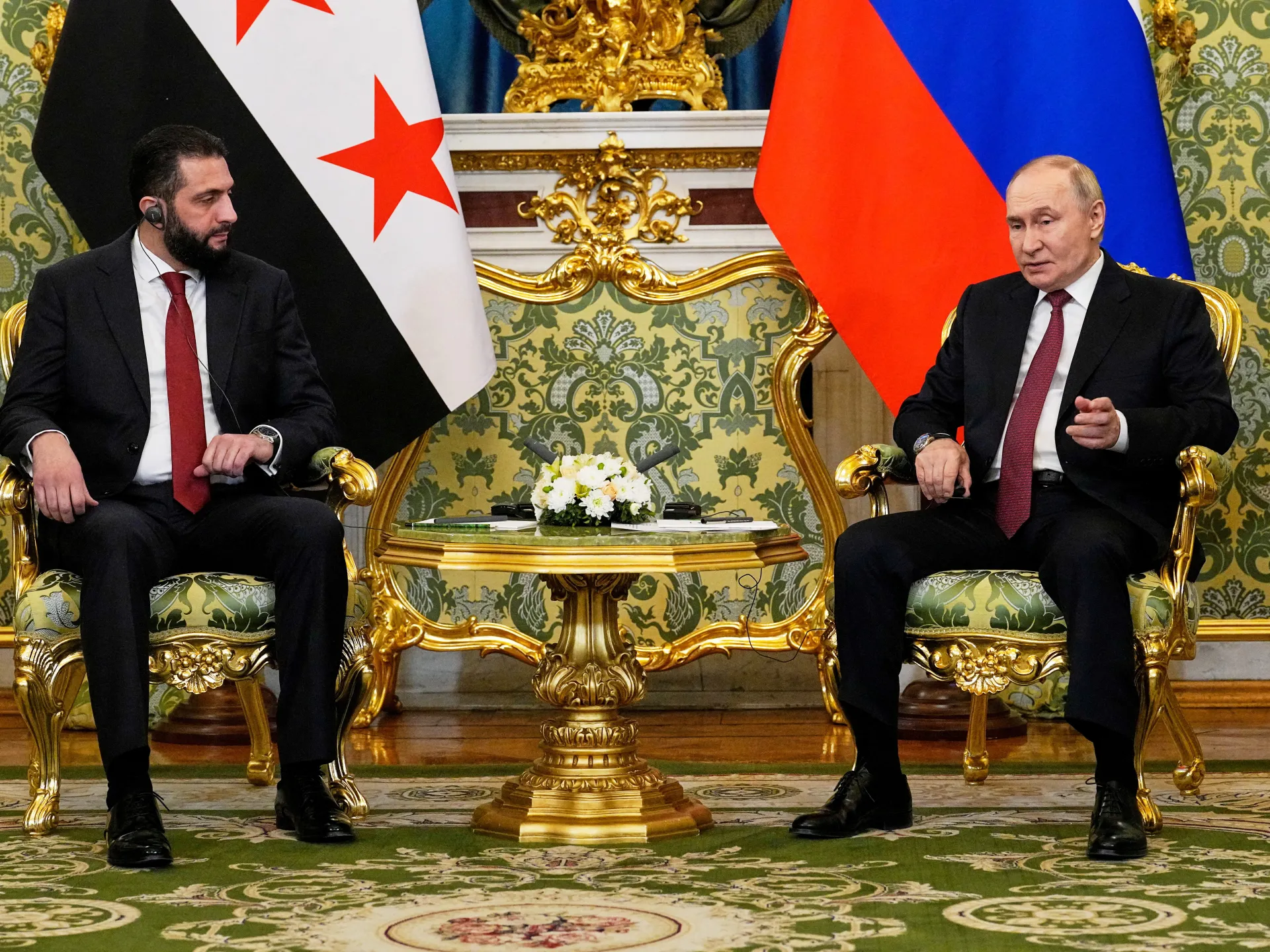Al-Sharaa meets Putin as Russia seeks to secure military bases in Syria | Vladimir Putin News
BREAKINGBREAKING,
Kremlin has not indicated whether it will agree to al-Sharaa’s repeated requests for Bashar al-Assad’s extradition.
Syrian President Ahmed al-Sharaa is meeting Russian President Vladimir Putin in Moscow as the latter seeks to shore up Russia’s presence in the country, including militarily, just over a year after al-Sharaa ousted Russia’s former ally, Bashar al-Assad.
Speaking at a news conference before their meeting on Wednesday, al-Sharaa thanked Putin for supporting unity in Syria and what he said was the “historic” role Russia had played in the “stability of the region”.
Recommended Stories
list of 3 itemsend of list
Putin expressed his support for al-Sharaa’s ongoing efforts to stabilise Syria and congratulated him on gaining momentum towards “restoring the territorial integrity of Syria”.
Putin and al-Sharaa spent more than a decade on opposing sides of Syria’s civil war, prompting concerns in Moscow about the future of Russia’s military presence there.
Before the talks, Kremlin spokesman Dmitry Peskov said “the presence of our soldiers in Syria” would be discussed. They are stationed at the Khmeimim airbase and the Tartous naval base in Syria’s Mediterranean coastal region.
Earlier this week, Russia reportedly withdrew its forces from the Qamishli airport in Kurdish-held northeastern Syria, leaving it with only its two Mediterranean bases – now its only military outposts outside the former Soviet Union.
Amberin Zaman, a correspondent with the Middle East news outlet Al-Monitor, published footage that she said was from the abandoned base in Qamishli on Monday.
Syria had historically been one of Moscow’s closest allies in the Middle East. Their ties go back to the Cold War when the Soviet Union provided extensive military and other types of support to the Baathist regime in Damascus, led first by Hafez al-Assad and then his son Bashar.
Moscow had been worried about the possibility of a “populist anti-Russia” government emerging in Damascus when Bashar al-Assad was overthrown, Samuel Ramani, an associate fellow at the London-based RUSI think tank, told Al Jazeera.
“They feared he [al-Sharaa] would squeeze them out, but the Russians have been pleasantly surprised, even if they’ve had to downgrade their ties from before,” Ramani added.
Pragmatic approach
Al-Sharaa has taken a pragmatic approach, Ramani said, seeking to build his own relations with extra-regional powers as a hedge against possible political swings in the United States.
“The Republicans are lenient towards Syria engaging Russia as long as they keep Iran out,” Ramani said, “whereas the Democrats have been more sceptical overall and have wanted to move slower on the removal of sanctions and other issues.”
“Al-Sharaa also needs Russia, and that is why he is engaging,” he said.
Al-Sharaa played down Russia’s role in Syria’s war and sought to strike a friendlier tone during his first visit to Moscow in October despite Russia providing refuge to Bashar al-Assad and his wife, who fled the country in December 2024 as al-Sharaa-led opposition fighters advanced towards Damascus.
Al-Sharaa has requested al-Assad’s extradition and said at an event last month that there would be justice for Syrians who were victims of the former president’s repression.
Putin will be especially eager to maintain Russia’s presence in Syria, having lost another ally this month when the US sent special forces to abduct Venezuelan President Nicolas Maduro.
On Tuesday, Russian Defence Minister Andrey Removich Belousov said after a meeting with his Chinese counterpart that Moscow was closely monitoring the situation in Venezuela and with Iran, which has close ties with Russia and has been facing threats of attack from the US in recent weeks.
Syria’s new leaders have reoriented the country’s foreign policy away from Russia and have said they’re seeking to build a strategic relationship with the US, which has been reciprocated by the Trump administration.
The US appeared not to follow through with warnings to the Syrian government against engaging the Kurdish-led, US-supported Syrian Democratic Forces this month but later helped broker a truce to end the fighting.
A fragile ceasefire is now in place and has been largely holding.
